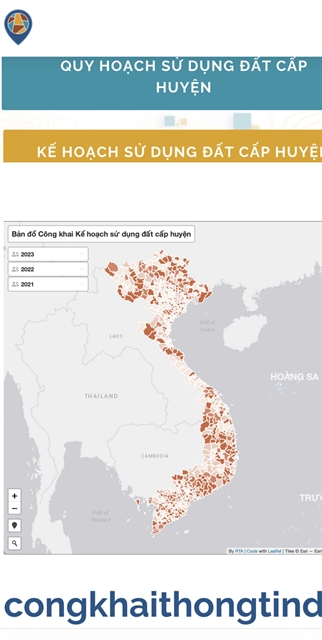 Society
Society

 |
| A map of the district-level land use master plan in Việt Nam published online. |
HÀ NỘI – About 73 per cent of provinces and central-level cities in Việt Nam have disclosed land pricing frameworks on their web portals as of October 2023, according to a review released on Tuesday by the United Nations Development Programme (UNDP) in Việt Nam, Real-Time Analytics and the Centre for Education Promotion and Empowerment of Women.
This demonstrates significant improvements in the transparency of disclosing land use plans and land pricing frameworks on the web portals of provincial and district governments.
The review studied the disclosure of land information by local authorities in Việt Nam from 2021 to the present. It aims to measure adherence to Vietnamese laws on land and access to information, which specify responsibilities, processes, forms and deadlines for disclosing information on provincial land pricing frameworks, district-level land use master plans and annual plans, as well as an obligation to provide these types of information at the request of citizens.
According to the study, by October 6, 2023, out of a total of 705 district units nationwide, 65.4 per cent have disclosed district-level land use master plans for the period 2021-2030, an increase of 16.5 per cent compared to 2022.
However, the review pointed out that the proportion of district-level government agencies that did not respond to citizens’ requests for information remained high.
By the end of 2023, 23.7 per cent of the requested agencies had provided the information, 1.1 per cent rejected the requests, while 5.3 per cent responded but did not provide information, and 67.9 per cent did not respond.
The research group recommended relevant agencies at provincial and district levels fully implement the disclosure of land information both online on the agencies’ web portals and at their headquarters in order to promote the disclosure of land information by State agencies.
Hoàng Thị Vân Anh, former head of the Legal Department under Việt Nam General Department of Land Administration, Ministry of Natural Resources and Environment, said the disclosure of land information is directly linked to local people’s rights. Disclosing land use master plans will help local residents know the future of their land lots, while publicising land pricing will let them know their financial obligations and the level of tax they will have to pay.
Nguyễn Thị Kim Thoa, former head of the Department of Criminal and Administrative Legislation under the Ministry of Justice, said it is necessary to ensure citizens’ access rights to land use information following the Constitution. Everyone has the rights to get access to the land information for the places where they are living.
UNDP Resident Representative Ramla Khalidi said the transparent disclosure of land information is crucial in mitigating the risks of land-related complaints and conflicts.
Tracking performance in implementing laws regarding land information disclosure to the public becomes particularly important as we approach the enforcement of the 2024 Land Law from January next year, she said.
Lê Đặng Trung, Real-Time Analytics director, said: “We hope that the Government will soon include the procedure for information provision at the request of citizens in the current set of administrative procedures of all sectors and fields, including land administration.” – VNS




